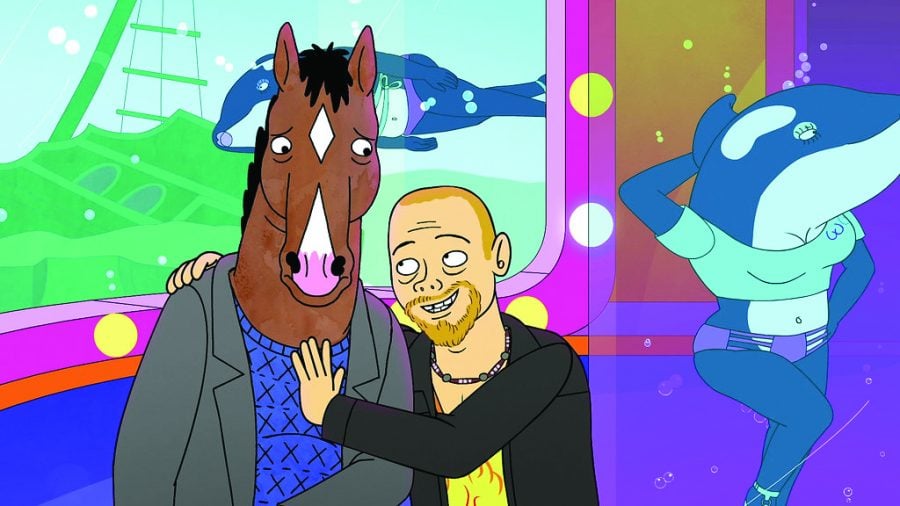Reel Thoughts: The final season of “BoJack Horseman” is shaping up to be one of the show’s best
Source: Netflix/ Festival international du film d’animation-Annecy
A scene from BoJack Horseman.
November 21, 2019
This piece contains spoilers for Season 6 of “BoJack Horseman.”
CW: mental illness
Five years ago, Netflix released an animated series about a middle-aged anthropomorphic horse struggling to find meaning in his life after a brief moment of sitcom fame. I can only imagine how persuasive creator Raphael Bob-Waksberg must have been to successfully pitch this concept, which is one of the most absurd TV setups of all time.
That show, of course, is “BoJack Horseman,” and after half a decade on Netflix, it has established itself as one of the most heartfelt and intelligent shows of the 21st century. Although it centers on a fictional Hollywood populated by cartoon animals, “BoJack” is TV’s most accurate portrayal of loneliness, depression and the dark side of the entertainment industry. Its combination of clever, laugh-out-loud comedy and genuinely tear-jerking moments makes the series one of the best of all time.
Sadly, “BoJack” is coming to an end. Netflix released the first half of the final season last month and will release the second half in January. But fortunately, the writers are at the top of their game in the first half of Season 6, which is shaping up to be one of the show’s best. The beginning of the final season has everything that caused viewers to fall in love with “BoJack” in the first place. The comedic moments poke fun at capitalism, Americans’ obsession with celebrities and more, while the darker moments continue to peel back the layers of BoJack’s troubled psyche.
Although BoJack’s character arc is unprecedentedly uplifting for most of the first half’s eight episodes, the final moment of the last episode is one of the series’ darkest and most powerful.
The supporting characters’ arcs are also excellent. Among other plotlines, Diane starts coming to terms with her depression and Princess Carolyn finds new meaning in life as a single mother. As a result, there’s not a dull moment in the season — all eight episodes are emotionally affecting in one way or another.
And although none of the season’s episodes are series-defining standouts — like Season 5’s “Free Churro,” Season 4’s “Time’s Arrow” and Season 3’s “That’s Too Much, Man!” — they’re consistently entertaining. In other words, while “BoJack” writers aren’t doing anything groundbreaking with the first part of Season 6, they’re sticking to what the show does best. And when that show is among the best of the century so far, there’s nothing wrong with that.
What truly makes “BoJack” stand out is its portrayal of mental illness, and Season 6 continues that trend. BoJack and Diane both struggle with depression, and the show continues to provide a refreshingly authentic portrayal of their mental health issues. While both characters are starting to recover, it’s a long, complicated process, and we can see that neither of them will ever be completely “cured.” For a show whose main character is a horse, “BoJack” is one of the most human shows on TV.
Season 6 also explores how society’s treatment of mental illness mixes with celebrity culture. Diane, for instance, receives little support for her depression from anybody except her boyfriend because she’s not a celebrity. However, media outlets are quick to name movie star Mr. Peanutbutter, who doesn’t actually struggle with mental health problems, as “the face of depression” because he feels bad about cheating on his girlfriend. This is a cynical but painfully honest commentary on the negative effects of celebrity culture. While celebrities get support from millions of adoring fans for problems that don’t really exist, ordinary people often suffer in silence. It’s exactly the sort of profound truth you wouldn’t expect to see in a cartoon about a horse, and that’s “BoJack” at its hilarious, biting prime.
Season 6 of “BoJack” started off on a near-perfect note. With the show ending in a few short months, I’m both dreading and looking forward to January. In a show characterized by rapid ups and downs, it’s impossible to know whether the finale will be heartwarming or tragic. Regardless of the note on which the series ends, Netflix will feel emptier in a post-”BoJack” world.
Email: [email protected]
Twitter: @OwenStidman


